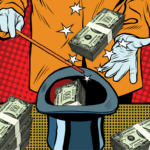I used to have a mental picture of “difficult” major donors, based on horror stories I’d heard.
I imagined a cigar-chomping business tycoon who wanted to use large donations to remake a nonprofit to fit his own preferred vision, not really caring whether that fit the organization’s mission or not.
Boy was I short-sighted! The “business tycoon behaving badly” thing does happen, and it’s something you should be on guard for in case it happens to you.
But it’s not the most common way major donors can challenge us. More often, the donor’s motives — and our response — can be challenging in a different way.
An example of this recently came up in The Fundraisingology Lab members-only community where a smart fundraiser brought up their situation…
The major donor was truly a special person. She’d been giving large amounts annually for many years and had included the organization in her will. The donor really didn’t want much attention. The organization had put her name on a plaque in a facility she had funded. The donor had also been featured in an article in the organization’s magazine. They met with the donor once or twice a year and kept her up to date on the projects she supported.
But more recently, things started to change. The donor – who doesn’t have any immediate family in her life – had increasingly sought the organization for attention and help, with frequent phone calls. She was asking for help getting to appointments and other practical tasks. She had also been asking to be recognized in the magazine again. It’s clear the donor was struggling with loneliness and lack of connection with friends and family. She’d been seeing the organization as a substitute for those connections.
The demand on our member’s time had been growing. She wanted to help, and felt a duty of care and gratitude for the donor, but it was getting beyond reasonable.
It’s important to remember that while this is a challenge, it’s a beautiful sort of challenge to have. A donor who is highly involved, cares a lot, and has given generously. A professional fundraiser who loves and cares for the donor. How many professions bring people together in such a deeply human way? We can count our blessings!
Still, it’s a difficult situation. What should she do?
Well, as they always do, our members of The Fundraisingology Lab had some very useful advice for the situation.
Here’s some of the incredible help they shared….
Tracey Willmott, Director of Philanthropy at Native Plant Trust in Framingham, Massachusetts, suggested getting board members or other volunteers to help out by calling donors and/or sending them notes:
We had a similar situation with a donor who became forgetful, and we came up with a schedule of re-sending information to them and a group of people who all called to check in with them (repeating the same conversations again and again) and writing notes to say how much their support has been appreciated.
Lisa Marmelstein Blackwell, board president at Friends of Kilmer Mansion in Binghampton, New York, had a number of practical suggestions for dealing with frequent phone calls and other communications from a donor:
- When you are away or need to be unavailable for calls, set your out-of-office reply to say you won’t be returning emails or phone calls until you’re back, and when that will be.
- Have separate phone numbers for personal and office use. Give donors the office number.
- Have someone else they can reach out to when you’re not available in case they really do need something that can’t wait.
- Set and maintain boundaries by communicating clearly and kindly when you are and are not available — and stick to what you say. If you say you’re not available and then answer your phone or call or email them back anyway, they will continue to contact you when you’re out of the office. If you are gentle but firm, they will likely stop eventually (although it might take a while).
Kristine in Lincoln Nebraska brought up the power of sending donor-framed photos that show their impact in action: “I’ve had donors over the years tell me that carefully selected recognition photos reminded them of why they gave and that they often looked at them.
“You could even put together a poll of photos and write several notes all at once, to send to the donor in the future at regular intervals. Even a simple note that says, ‘I was looking through photos and came across this one, and it reminded me of how much you have made possible through your gifts…’ would be meaningful.”
While some donors’ behavior can be difficult or challenging to manage, it’s best to start with the assumption that they don’t have bad motives for what they ask you to do. Then treat them with love and care. But set boundaries!
When you face unexpected fundraising challenges, your resource is like-minded professionals, like those you’ll find when you join The Fundraisingology Lab by Moceanic. You’ll be part our supporting community of cool fundraisers who support each other … and can help you go to new places in your fundraising career. You’ll also get the tools, training, and information, to do your best work every time. Join the waiting list now and you’ll be the first to hear when the doors to membership open!
Related Blog Posts:










